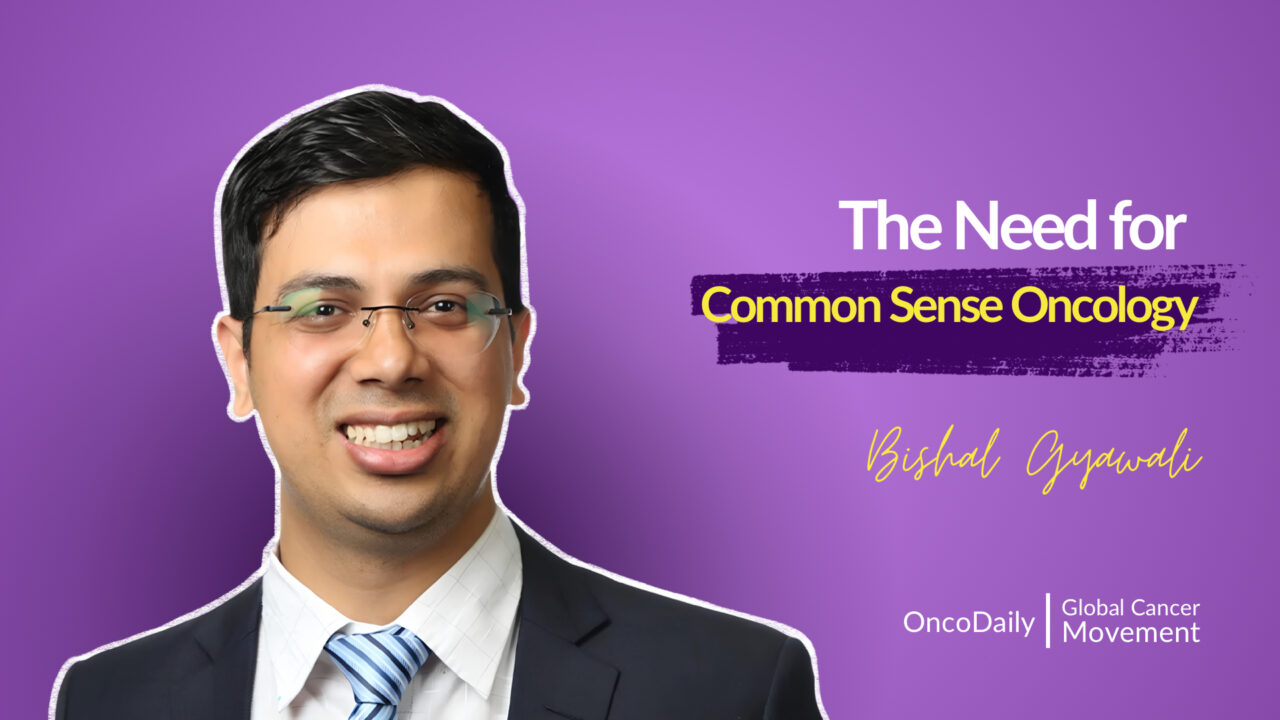
The Need for Common Sense Oncology – Global Cancer Movement
In the inaugural event of the Global Cancer Movement, initiated by OncoDaily, Dr. Bishal Gyawali delivers a thought-provoking talk on the disparities in cancer care and the critical gap between groundbreaking innovations and real-world patient outcomes. The virtual event, held from December 6-8, 2024, brought together experts to address key challenges in oncology, emphasizing the need for equitable cancer care worldwide.
Dr. Bishal Gyawali delves into critical reflections on the current state of cancer research, treatment, and care, emphasizing the dissonance between the exciting developments in oncology and their real-world impact. They begin by acknowledging the enthusiasm around groundbreaking research and future technologies aimed at solving cancer but caution against over-optimism. The speaker underscores the importance of addressing systemic and practical challenges that hinder equitable access to effective treatments.
The discussion points to the modest average survival improvements of less than four months achieved through new FDA-approved drugs, highlighting the gap between innovation and meaningful patient outcomes. Despite substantial financial investments in oncology—citing the U.S.’s $200 billion annual expenditure—the speaker reveals a lack of correlation between spending and reduced cancer mortality.
They suggest that global inequities in cancer care, particularly in low- and middle-income countries, exacerbate the problem, as many patients lack access to even basic treatments like radiotherapy and surgery.
A significant portion of the talk critiques flaws in clinical trial design and reporting, which often inflate results without delivering real-world benefits. Examples include the approval of drugs based on non-randomized trials, outdated control arms, narrow eligibility criteria, and inappropriate methodologies like lenient non-inferiority thresholds or excessive reliance on crossover designs.
Bishal Gyawali also critiques sensational media reporting, which frequently misrepresents preliminary or marginal findings as revolutionary breakthroughs, misleading both patients and the public. For instance, headlines about therapies “curing” terminal cancer or being “game changers” are often based on limited evidence, such as single case reports or trials with negligible comparative outcomes.
He introduces the concept of “desperation oncology,” where aggressive treatments are pursued at the end of life despite their limited efficacy and potential harm to patients’ quality of life. They advocate for a shift in priorities, emphasizing the need for honest conversations with patients about care goals and prioritizing interventions that genuinely improve well-being.
The presentation culminates with the introduction of the Common Sense Oncology movement, which the speaker helped establish in 2023 to advocate for pragmatic, patient-centered cancer care. This movement emphasizes three dimensions—delivery of care, research and policy, and education—aimed at ensuring treatments focus on outcomes that matter to patients.
Their manifesto, published in The Lancet Oncology, promotes equity in cancer care, shared decision-making, evidence-based treatment, and the integration of psychosocial, survivorship, and palliative care into oncology practices. Bishal Gyawali concludes by affirming the need to balance innovation with addressing foundational challenges to create a more equitable and effective oncology landscape.
-
ESMO 2024 Congress
September 13-17, 2024
-
ASCO Annual Meeting
May 30 - June 4, 2024
-
Yvonne Award 2024
May 31, 2024
-
OncoThon 2024, Online
Feb. 15, 2024
-
Global Summit on War & Cancer 2023, Online
Dec. 14-16, 2023
